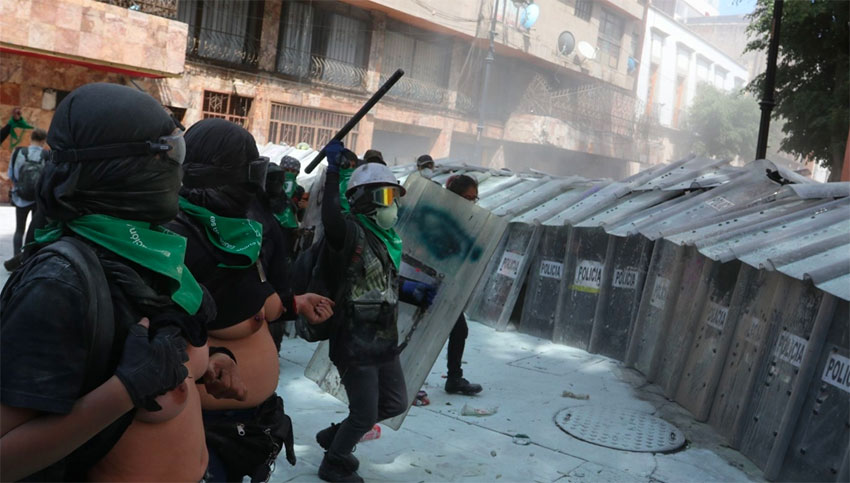
A march for abortion rights turned violent in Mexico City Sept. 27, as a group of women wearing ski-masks and armed with hammers clashed with police. Members of the Bloque Negro feminist collective joined the protest after departing from the headquarters of the National Human Rights Commission (CNDH), which they had been occupying for weeks and had turned into a shelter for victims of gender violence. With their path to the city’s historic center blocked by riot police, some threw paint balloons and Molotov cocktails, and charged the police lines. Some of the women also bared their breasts, even as they wore goggles and helmets. Authorities said 11 police were injured in the confrontation. The demonstration was part of a Day for Decriminalization of Abortion in Latin America & the Caribbean on the eve of International Safe Abortion Day, Sept. 28. In Mexico, abortion is only legal in the Federal District and southern state of Oaxaca during the first 12 weeks of pregnancy. In the rest of the country, it is only permitted under limited circumstances, such as in the case of rape. (Mexico News Daily, Yucatan Times)
Photo via Mexico News Daily





Argentina law legalizing abortion comes into force
Argentina’s Voluntary Interruption of Pregnancy Law, approved by the Chamber of Deputies and the Senate last month, came into force Jan. 24.
The law gives a choice to women and other “gender identities” to terminate their pregnancy within 14 weeks of pregnancy. Beyond 14 weeks, pregnancy can be terminated only in cases of rape, or when there is a risk to the individual or the child.
With this law, Argentina joins Cuba and Uruguay as Latin American countries that have legalized abortion. (Jurist)
Mexico Supreme Court votes to decriminalize abortion
Mexico’s Supreme Court unanimously ruled Sept. 7 that criminalizing abortion is unconstitutional. In its decision, the high court had considered a challenge to a state law in Coahuila, which set prison penalties of up to three years for having an abortion. The justices struck down the state law, finding that any criminal penalization of abortion violates Mexico’s Constitution. The ruling follows efforts by women’s groups that began well over a decade ago, with the legalization of abortion in Mexico City in 2007. Groups have since successfully pushed for the procedure to be decriminalized in the states of Oaxaca, Hidalgo and Veracruz. (NYT)
Colombia decriminalizes abortion in historic ruling
Women in Colombia are free to end pregnancies until the 24th week after insemination, the Constitutional Court said in a historic ruling. Until Feb. 21, women were only allowed to abort pregnancies in cases of rape, or if the life of the mother or unborn baby were seriously compromised. The ruling was celebrated by women who had gathered in front of the court building in Bogota to demand the legalization of abortion. (Colombia Reports)
Mexico Supreme Court decriminalizes abortion nationwide
Mexico’s Supreme Court threw out all federal criminal penalties for abortion Sept. 6, ruling that national laws prohibiting the procedure are unconstitutional and violate women’s rights. The high court ordered that abortion be removed from the federal penal code. The ruling will require the federal public health service and all federal health institutions to offer abortion to anyone who requests it. (Politico)